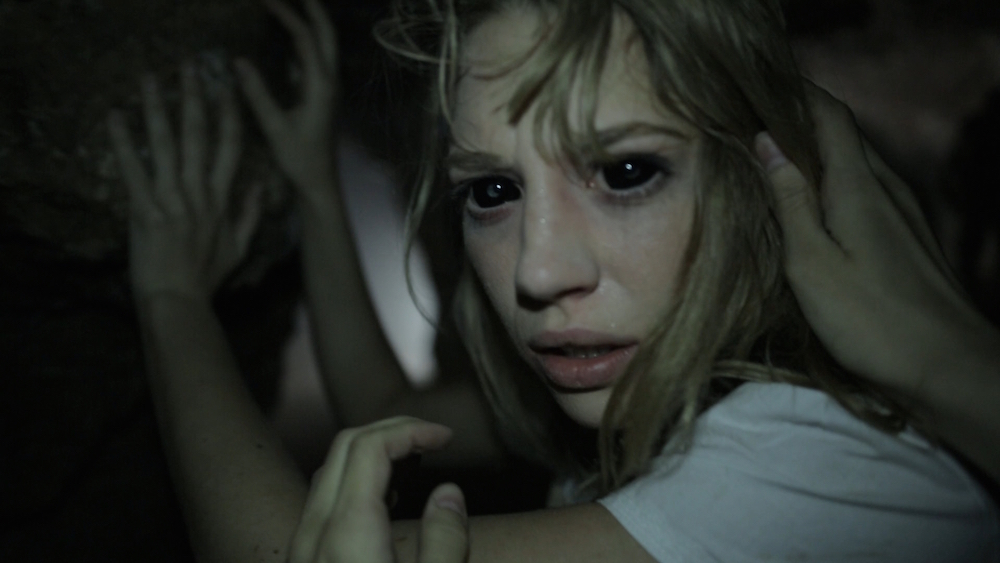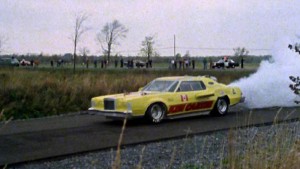
Found footage is, in its best iterations, a way to make a film on the cheap that can engage an audience while experimenting with new ways to tell stories. From Man Bites Dog‘s acerbic commentary on cultural violence to Lake Mungo‘s haunting and powerful evocations of familial drama and hardship to Unfriended‘s fascinating and innovative editing and art direction (used to prop up inanity, sure, but nonetheless), the style, however derided, has been consistently ahead of the game in its innovation and promise. It’s the reason I go out of my way to track down every found footage film I can. Even no-budget shlock-fests like Eyes in the Dark make fascinating use of multiple perspectives, jumbled story structure, and surprisingly effective monsters that, if they had to withstand the scrutiny of more traditional cinema’s viewpoint, would fall apart. Plus, as a horror fan, I love finding movies that can actually still scare me, and found footage is one of the few things that can consistently do that, even in its sloppiest iterations. So when Jeruzalem, a 2015 found footage horror film from Israel, made its way into my life, I pounced on it, really intrigued by what it could do with such a fascinating setting and inherently experimental form. Unfortunately, while not terrible by any means, its retreading of tropes was hardly the masterful regurgitation that Grave Encounters was and just ended up melting into the half-remembered pool of mediocre hand-camera horror films that I hesitate to retrieve much from these days.
The story follows two young Jewish women who, on their way to Tel Aviv for a vacation, end up detouring to Israel on the request of an attractive Catholic manpiece named Kevin. Sarah, the slightly more conservative of the pair, recently lost her brother, and her father got her a pair of Google glasses before the trip. This is the lens we see the rest of the movie through, and in the early goings at least it naturally and successfully integrates the many features of Google glass into the film’s goings on, bringing up social media accounts when important, showing us videos from Youtube, Wiki searches, and so forth. Once there, they meet Omar, the Muslim son of the owner of the hostel they are staying at. While Rachel parties with Omar, Sarah and Kevin get closer, and his apocalyptic fears begin to make him question their safety. Eventually, as might be imagined, all hell breaks loose, and our characters must fight for their lives in a city overrun with…well, zombies, but like, there’s religion mixed in there somewhere.
I want to point out my praises first, and one of the biggest ones goes towards the uniformly excellent cast. Everyone really nails their roles in a way you don’t usually see in found footage, i.e. they seem like real actors and not whoever walked in off the street and was willing to work for breadcrumbs. Danielle Jadelyn in particular anchors the movie as Sarah, making her sympathetic and vulnerable without leaning in too hard to her grief. In addition, though it most resembles middle of the road found footage snore-horror (snorer?) like As Above So Below or The Pyramid, it must be said that its pacing is much more expertly maintained, holding back where those movies dive in at a pace so breakneck that all the halfway decent scares are done in the first forty or so minutes. Instead of blowing it all before the second act is over, it knows that it has to save some things and build on itself in order to remain tense throughout and not cause exhaustion. It’s disciplined in many ways, dispensing information slowly and, besides one groaner of a sequence, doesn’t feel the need to insert the old fake jump scare before we get to the real business. It can at least be said that the pre-horror scenes of partying and hanging out at the hostel are far superior to, well, Hostel.
Unfortunately, it imitates more than it creates, which wouldn’t be so bad if it could stick the landing on its imitation. Its use of found footage, while at first interesting and engaging, gets perfunctory towards the end, the many many applications of Google glass only showing up when it’s convenient to the plot. In addition, the film sets up, seemingly on purpose, characters of every Abrahamic religion, and sets the action during Yom Kippur, but it doesn’t actually do anything with the religion that is so tantalizingly waved in front of our faces. There’s some lip service to everyone getting along, to all three religions really being the same, but that’s both A) uninteresting and disingenuous and B) totally unimportant to the film itself. It’s a situation ripe for supernatural horror of the Holy (or Unholy, as it were) kind, but instead its monsters are little more than zombies with wings, defaulting to the laziest horror movie monster instead of engaging with what it so clearly sets up. And hey, if it doesn’t want to write a grand treatise on the complicated nature of religion and cultural clashes in Israel, that’s fine, but the setup seems to promise that it’s going to do exactly that, and it just never does. Why painstakingly set your horror film in Jerusalem, and then never mine it for what it’s worth?
And those monsters really are a problem, because, besides one of the earliest horror sequences where Sarah hides from one underneath a desk, they absolutely are not scary, not even in a jump scare sort of way, and this is from someone who is incredibly easy to get with jump scares. This is where a little practical make-up and a little less CGI could go a long way, because they’d have to couch the evil in shadows to hide the seams, making every appearance mean more. Here, the seams are on full display at every chance, because the CGI, while decent enough, is overused to the point of boredom, making what are initially solid takes on the long-limbed, pale-skinned, huge-mouthed humanoids of so much recent horror (Renny Harlin’s superior Devil’s Pass comes to mind early and often) into just another piece of overdressed scenery. The settings, while often gorgeous, aren’t cleverly used, and they just don’t mean much to the movie as a whole. It’s a film with a fascinating setting that would not really change if its setting were changed.
It’s fine, really, it’s not truly “bad”, it’s just mildly uninteresting and a bit disappointing. It commits the main crime of bad found footage, in that it doesn’t really seem to know exactly what it’s using the style for. It’s just there, because that’s how movies look now, so why not? There’s a good movie hiding in here, some nugget of inspiration, a retelling of Revelations as seen through the eyes of a technological world, or maybe an allegorical examination of middle-east cultural tensions through supernatural horror, or even, I don’t know, just an excuse to run around spooky buildings while the devil chases you. All those would’ve been cool. The problem is that the good movie is continually discarded for the more rote one, one that imitates mostly competently but never chooses to excel. I am all for more horror films from cultures and countries without a large stable of them. Horror is so culturally specific that its rhythms, subject matter and style are often wonderfully morphed and mutated whenever some new player gets their hands on it, leading to brand new, fascinating forms and stories. What I’m not really here for are Israeli horror films that are just photocopies of decent-to-poor American horror films, and unfortunately, that’s mostly what Jeruzalem is.
—
Directed by Doron Paz and Yoav Paz (the Paz brothers); written by Doron Paz and Yoav Paz (the Paz brothers); starring Yael Grobglas, Danielle Jadelyn, Ton Tumarkin, and Tom Graziani; 94 minutes.
Jeruzalem is currently experiencing a limited release, and will be featured in the Miami Jewish Film Festival on Tuesday, January 19th.



 Derek
Derek
 Isabelle
Isabelle